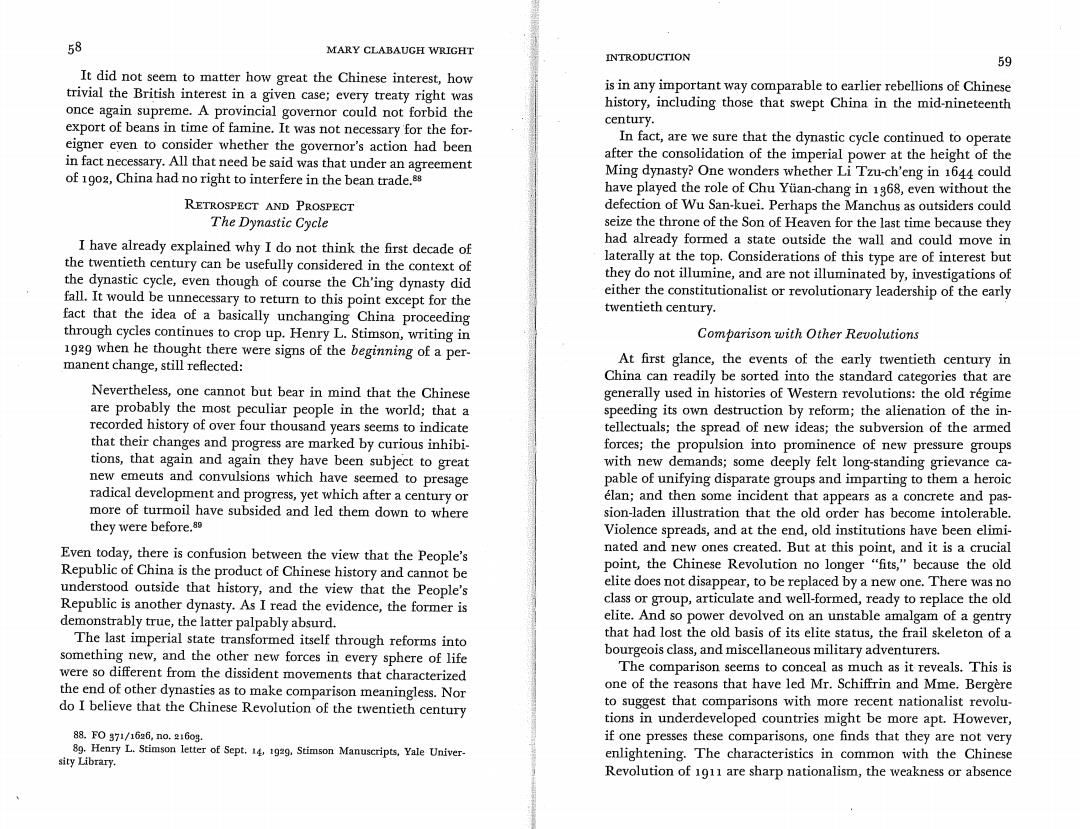
58 MARY CLABAUGH WRIGHT INTRODUCTION 59 It did not seem to matter how great the Chinese interest,how trivial the British interest in a given case;every treaty right was is in any important way comparable to earlier rebellions of Chinese once again supreme.A provincial governor could not forbid the history,including those that swept China in the mid-nineteenth export of beans in time of famine.It was not necessary for the for- century. eigner even to consider whether the governor's action had been In fact,are we sure that the dynastic cycle continued to operate in fact necessary.All that need be said was that under an agreement after the consolidation of the imperial power at the height of the of 1902,China had no right to interfere in the bean trade.s Ming dynasty?One wonders whether Li Tzu-ch'eng in 1644 could have played the role of Chu Yuan-chang in 1368,even without the RETROSPECT AND PROSPECT defection of Wu San-kuei.Perhaps the Manchus as outsiders could The Dynastic Cycle seize the throne of the Son of Heaven for the last time because they I have already explained why I do not think the first decade of had already formed a state outside the wall and could move in the twentieth century can be usefully considered in the context of laterally at the top.Considerations of this type are of interest but the dynastic cycle,even though of course the Ch'ing dynasty did they do not illumine,and are not illuminated by,investigations of fall.It would be unnecessary to return to this point except for the either the constitutionalist or revolutionary leadership of the early fact that the idea of a basically unchanging China proceeding twentieth century. through cycles continues to crop up.Henry L.Stimson,writing in Comparison with Other Revolutions 1929 when he thought there were signs of the beginning of a per- manent change,still reflected: At first glance,the events of the early twentieth century in China can readily be sorted into the standard categories that are Nevertheless,one cannot but bear in mind that the Chinese generally used in histories of Western revolutions:the old regime are probably the most peculiar people in the world;that a speeding its own destruction by reform;the alienation of the in- recorded history of over four thousand years seems to indicate tellectuals;the spread of new ideas;the subversion of the armed that their changes and progress are marked by curious inhibi- forces;the propulsion into prominence of new pressure groups tions,that again and again they have been subject to great with new demands;some deeply felt long-standing grievance ca- new emeuts and convulsions which have seemed to presage pable of unifying disparate groups and imparting to them a heroic radical development and progress,yet which after a century or elan;and then some incident that appears as a concrete and pas- more of turmoil have subsided and led them down to where sion-laden illustration that the old order has become intolerable. they were before.89 Violence spreads,and at the end,old institutions have been elimi- Even today,there is confusion between the view that the People's nated and new ones created.But at this point,and it is a crucial Republic of China is the product of Chinese history and cannot be point,the Chinese Revolution no longer "fits,"because the old understood outside that history,and the view that the People's elite does not disappear,to be replaced by a new one.There was no Republic is another dynasty.As I read the evidence,the former is class or group,articulate and well-formed,ready to replace the old demonstrably true,the latter palpably absurd. elite.And so power devolved on an unstable amalgam of a gentry The last imperial state transformed itself through reforms into that had lost the old basis of its elite status,the frail skeleton of a something new,and the other new forces in every sphere of life bourgeois class,and miscellaneous military adventurers. were so different from the dissident movements that characterized The comparison seems to conceal as much as it reveals.This is the end of other dynasties as to make comparison meaningless.Nor one of the reasons that have led Mr.Schiffrin and Mme.Bergere do I believe that the Chinese Revolution of the twentieth century to suggest that comparisons with more recent nationalist revolu- tions in underdeveloped countries might be more apt.However, 88.F0371/1626,no.2160g if one presses these comparisons,one finds that they are not very 89.Henry L.Stimson letter of Sept.14 1929.Stimson Manuscripts,Yale Univer- sity Library. enlightening.The characteristics in common with the Chinese Revolution of 1911 are sharp nationalism,the weakness or absence
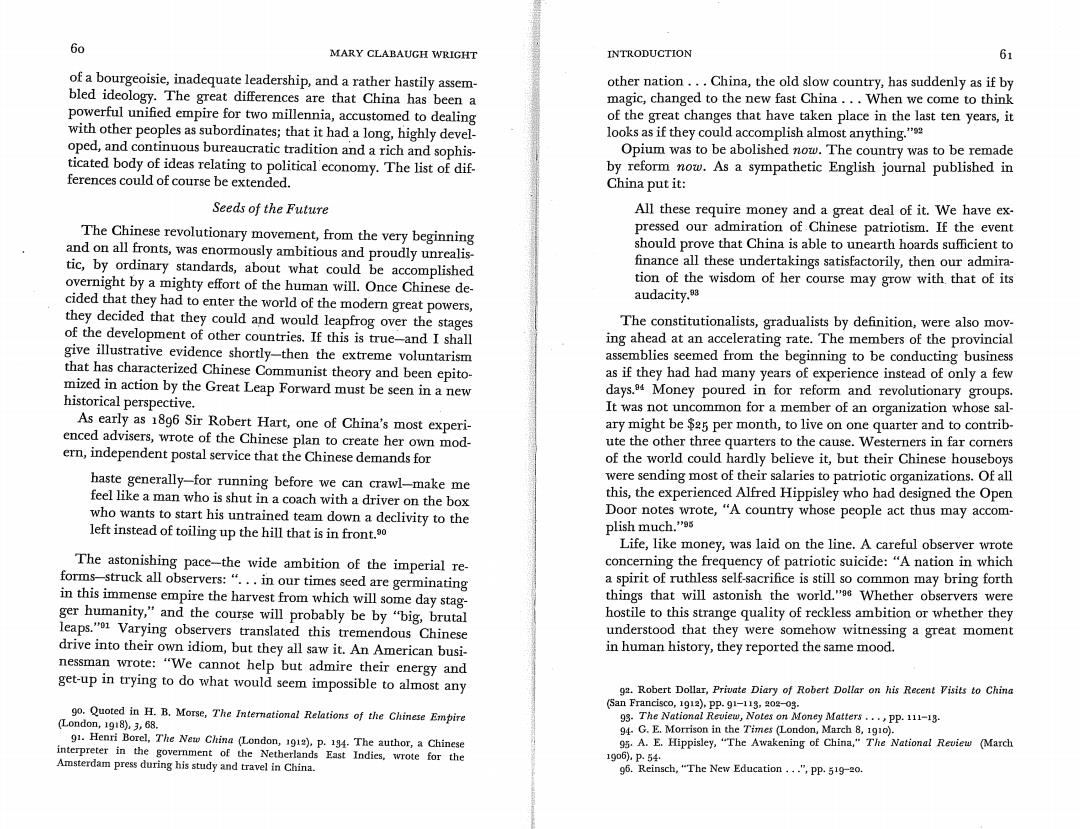
60 MARY CLABAUGH WRIGHT INTRODUCTION 61 of a bourgeoisie,inadequate leadership,and a rather hastily assem- other nation...China,the old slow country,has suddenly as if by bled ideology.The great differences are that China has been a magic,changed to the new fast China...When we come to think powerful unified empire for two millennia,accustomed to dealing of the great changes that have taken place in the last ten years,it with other peoples as subordinates;that it had a long,highly devel- looks as if they could accomplish almost anything. oped,and continuous bureaucratic tradition and a rich and sophis- Opium was to be abolished now.The country was to be remade ticated body of ideas relating to political economy.The list of dif- by reform now.As a sympathetic English journal published in ferences could of course be extended. China put it: Seeds of the Future All these require money and a great deal of it.We have ex. The Chinese revolutionary movement,from the very beginning pressed our admiration of Chinese patriotism.If the event and on all fronts,was enormously ambitious and proudly unrealis- should prove that China is able to unearth hoards sufficient to tic,by ordinary standards,about what could be accomplished finance all these undertakings satisfactorily,then our admira- overnight by a mighty effort of the human will.Once Chinese de- tion of the wisdom of her course may grow with.that of its cided that they had to enter the world of the modern great powers, audacity.98 they decided that they could and would leapfrog over the stages The constitutionalists,gradualists by definition,were also mov- of the development of other countries.If this is true-and I shall ing ahead at an accelerating rate.The members of the provincial give illustrative evidence shortly-then the extreme voluntarism assemblies seemed from the beginning to be conducting business that has characterized Chinese Communist theory and been epito- as if they hadhad many years of experience instead of only a few mized in action by the Great Leap Forward must be seen in a new days.34 Money poured in for reform and revolutionary groups. historical perspective. It was not uncommon for a member of an organization whose sal- As early as 1896 Sir Robert Hart,one of China's most experi- ary might be $5 per month,to live on one quarter and to contrib- enced advisers,wrote of the Chinese plan to create her own mod- ute the other three quarters to the cause.Westerners in far corners ern,independent postal service that the Chinese demands for of the world could hardly believe it,but their Chinese houseboys haste generally-for running before we can crawl-make me were sending most of their salaries to patriotic organizations.Of all feel like a man who is shut in a coach with a driver on the box this,the experienced Alfred Hippisley who had designed the Open who wants to start his untrained team down a declivity to the Door notes wrote,"A country whose people act thus may accom- left instead of toiling up the hill that is in front.0 plish much. Life,like money,was laid on the line.A careful observer wrote The astonishing pace-the wide ambition of the imperial re- concerning the frequency of patriotic suicide:"A nation in which forms-struck all observers:"..in our times seed are germinating a spirit of ruthless self-sacrifice is still so common may bring forth in this immense empire the harvest from which will some day stag- things that will astonish the world."9 Whether observers were ger humanity,"and the course will probably be by "big,brutal hostile to this strange quality of reckless ambition or whether they leaps.Varying observers translated this tremendous Chinese understood that they were somehow witnessing a great moment drive into their own idiom,but they all saw it.An American busi- in human history,they reported the same mood. nessman wrote:"We cannot help but admire their energy and get-up in trying to do what would seem impossible to almost any g2.Robert Dollar,Private Diary of Robert Dollar on his Recent Fisits to China go.Quoted in H.B.Morse,The International Relations of the Chinese Empire (San Francisco,1912),pp.91-113,802-03. (L0ndon,1918).3,68. 93.The National Review,Notes on Money Matters....pp.111-13. 91.Henri Borel,The New China (London,191),p.194.The author,a Chinese 94.G.E.Morrison in the Times (London,March 8.1g1o). interpreter in the government of the Netherlands East Indies.wrote for the 95.A.E.Hippisley,"The Awakening of China,"The National Review (March 19o6).p.54. Amsterdam press during his study and travel in China. 96.Reinsch,"The New Education...",pp.519-20
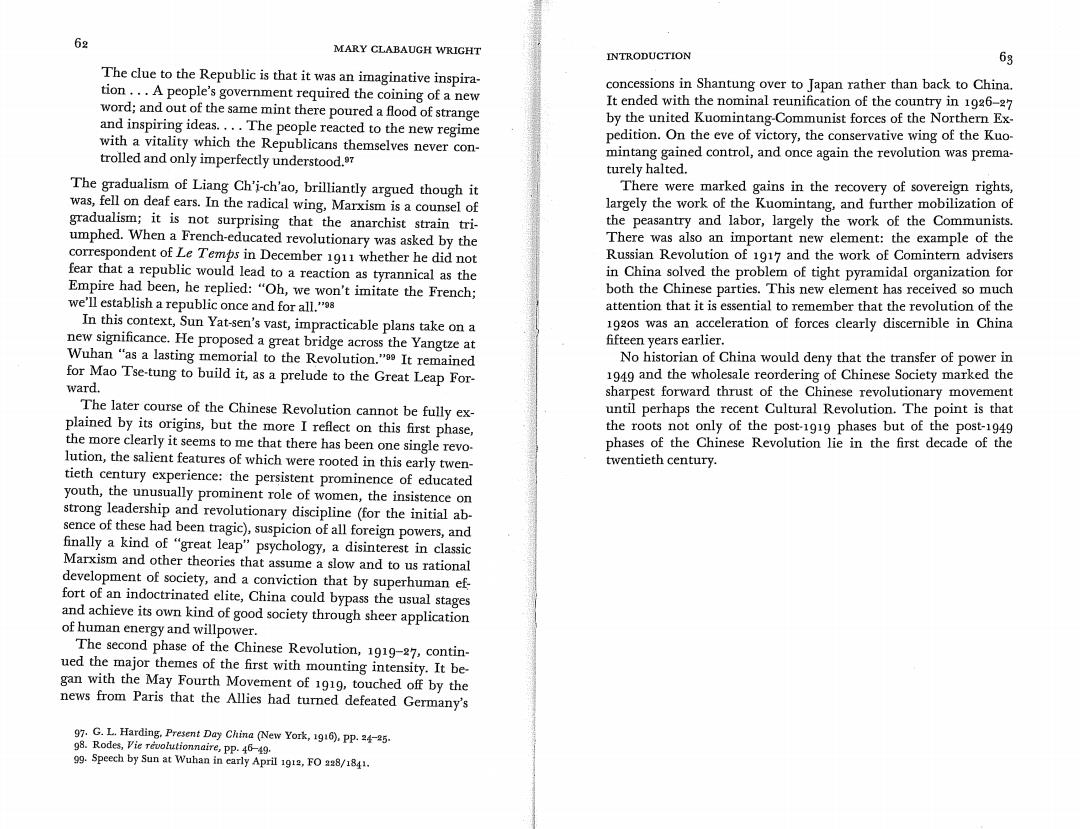
62 MARY CLABAUGH WRIGHT INTRODUCTION 69 The clue to the Republic is that it was an imaginative inspira- tion...A people's government required the coining of a new concessions in Shantung over to Japan rather than back to China. word;and out of the same mint there poured a flood of strange It ended with the nominal reunification of the country in 1926-27 and inspiring ideas....The people reacted to the new regime by the united Kuomintang-Communist forces of the Northern Ex- with a vitality which the Republicans themselves never con- pedition.On the eve of victory,the conservative wing of the Kuo- trolled and only imperfectly understood.97 mintang gained control,and once again the revolution was prema- turely halted. The gradualism of Liang Ch'i-ch'ao,brilliantly argued though it There were marked gains in the recovery of sovereign rights, was,fell on deaf ears.In the radical wing,Marxism is a counsel of largely the work of the Kuomintang,and further mobilization of gradualism;it is not surprising that the anarchist strain tri- the peasantry and labor,largely the work of the Communists. umphed.When a French-educated revolutionary was asked by the There was also an important new element:the example of the correspondent of Le Temps in December 1911 whether he did not Russian Revolution of 1917 and the work of Comintern advisers fear that a republic would lead to a reaction as tyrannical as the in China solved the problem of tight pyramidal organization for Empire had been,he replied:"Oh,we won't imitate the French; both the Chinese parties.This new element has received so much we'll establish a republic once and for all."98 attention that it is essential to remember that the revolution of the In this context,Sun Yat-sen's vast,impracticable plans take on a 192os was an acceleration of forces clearly discernible in China new significance.He proposed a great bridge across the Yangtze at fifteen years earlier. Wuhan "as a lasting memorial to the Revolution."99 It remained No historian of China would deny that the transfer of power in for Mao Tse-tung to build it,as a prelude to the Great Leap For- 1949 and the wholesale reordering of Chinese Society marked the ward. sharpest forward thrust of the Chinese revolutionary movement The later course of the Chinese Revolution cannot be fully ex- until perhaps the recent Cultural Revolution.The point is that plained by its origins,but the more I reflect on this first phase, the roots not only of the post-1919 phases but of the post-1949 the more clearly it seems to me that there has been one single revo- phases of the Chinese Revolution lie in the first decade of the lution,the salient features of which were rooted in this early twen- twentieth century. tieth century experience:the persistent prominence of educated youth,the unusually prominent role of women,the insistence on strong leadership and revolutionary discipline (for the initial ab- sence of these had been tragic),suspicion of all foreign powers,and finally a kind of"great leap"psychology,a disinterest in classic Marxism and other theories that assume a slow and to us rational development of society,and a conviction that by superhuman ef fort of an indoctrinated elite,China could bypass the usual stages and achieve its own kind of good society through sheer application of human energy and willpower. The second phase of the Chinese Revolution,1919-27,contin- ued the major themes of the first with mounting intensity.It be- gan with the May Fourth Movement of 1919,touched off by the news from Paris that the Allies had turned defeated Germany's 97.G.L.Harding,Present Day China (New York,1916),pp.24-25. 98.Rodes,Vie rduolutionnaire,pp.649. 99.Speech by Sun at Wuhan in early April FO a8/1841
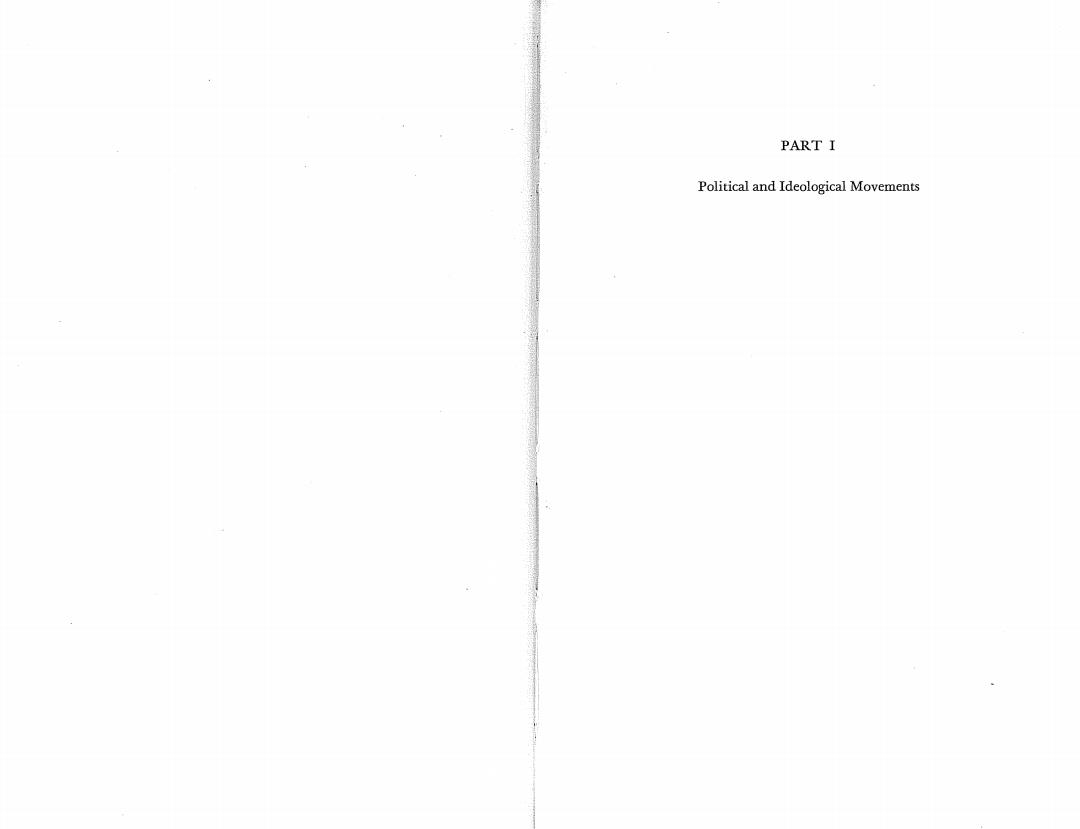
PART I Political and Ideological Movements
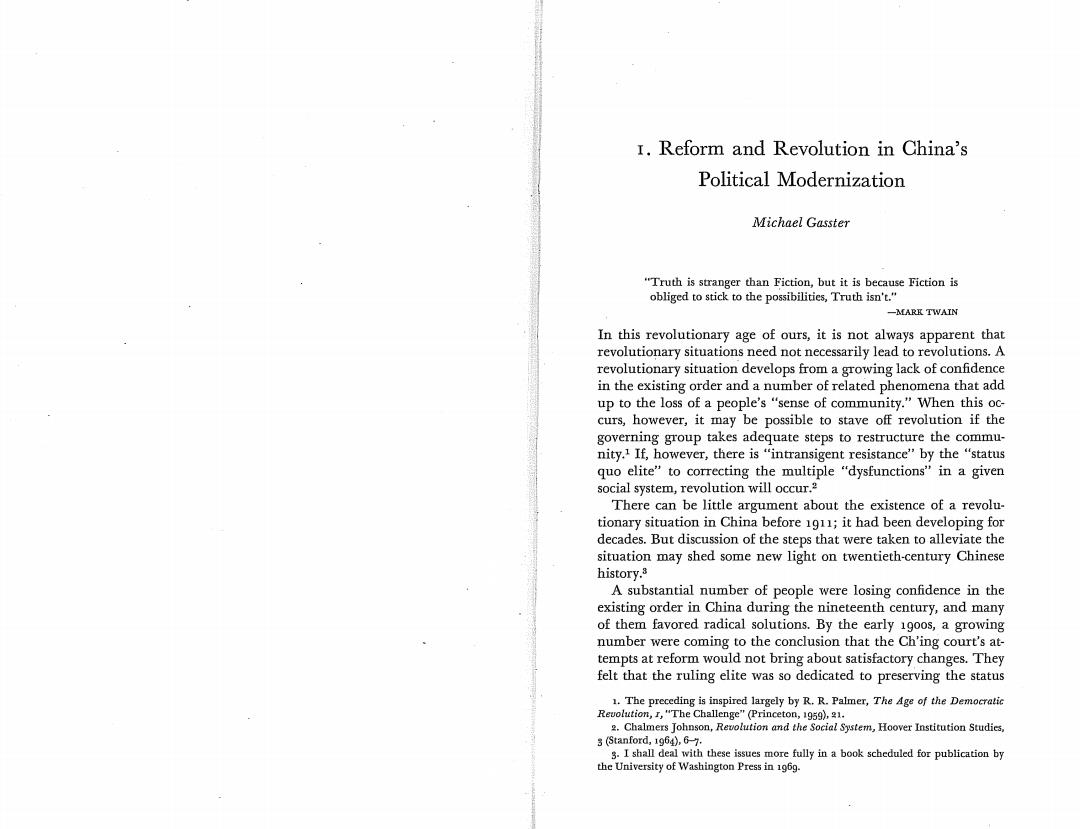
I.Reform and Revolution in China's Political Modernization Michael Gasster "Truth is stranger than Fiction,but it is because Fiction is obliged to stick to the possibilities,Truth isn't." -MARK TWAIN In this revolutionary age of ours,it is not always apparent that revolutionary situations need not necessarily lead to revolutions.A revolutionary situation develops from a growing lack of confidence in the existing order and a number of related phenomena that add up to the loss of a people's"sense of community."When this oc- curs,however,it may be possible to stave off revolution if the governing group takes adequate steps to restructure the commu- nity.1 If,however,there is "intransigent resistance"by the "status quo elite”to correcting the multiple“dysfunctions'”in a given social system,revolution will occur.2 There can be little argument about the existence of a revolu- tionary situation in China before 1911;it had been developing for decades.But discussion of the steps that were taken to alleviate the situation may shed some new light on twentieth-century Chinese history.3 A substantial number of people were losing confidence in the existing order in China during the nineteenth century,and many of them favored radical solutions.By the early igoos,a growing number were coming to the conclusion that the Ch'ing court's at- tempts at reform would not bring about satisfactory changes.They felt that the ruling elite was so dedicated to preserving the status 1.The preceding is inspired largely by R.R.Palmer,The Age of the Democratic Revolution,r,"The Challenge"(Princeton,1959),21. 2.Chalmers Johnson,Revolution and the Sociel System,Hoover Institution Studies, 3(Stanford,1964),6-7. 3.I shall deal with these issues more fully in a book scheduled for publication by the University of Washington Press in 196g